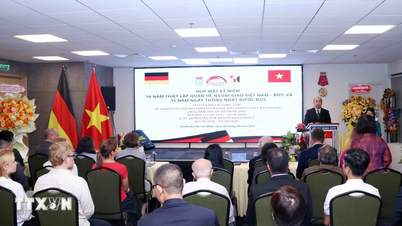Vietnam Trade Union proposed that all levels study reducing working hours of employees in enterprises to less than 48 hours per week, towards 40 hours, equal to the state sector.
Eight petitions from workers nationwide were collected by the Vietnam General Confederation of Labor and submitted to senior leaders at the 13th General Confederation of Labor Congress on December 3.
The union cited the content of Resolution 101 of the National Assembly issued in 2019, "assigning the Government, based on the socio-economic development situation, to study and propose reducing normal working hours for employees to less than 48 hours per week and report to the National Assembly for consideration at an appropriate time."
This organization recommends that the Government assign the Ministry of Labor, War Invalids and Social Affairs to preside over and, together with other ministries and sectors, promptly study the reduction of working hours for workers, ensuring fairness with the state administrative sector (40 hours). The goal is to allow workers to rest, regenerate their strength, and take care of their families.

Shift hours of workers at a garment company in Ho Chi Minh City, November 2023. Photo: Thanh Tung
Current law stipulates that employees work under normal conditions no more than 8 hours per day and 48 hours per week. Enterprises have the right to regulate working hours by day or week but must notify employees. The State encourages enterprises to implement a 40-hour work week.
At the group discussion a day ago, Mr. Dang Tuan Vu, Chairman of the Changshin Company's union, the largest employer in Dong Nai with 37,000 workers, said that the roadmap to reduce working hours to 40 hours per week is the desire of many workers. In 2015, daily wages were gradually adjusted by law to receive monthly wages, workers expected to reduce working hours so that they could rest on weekends, but so far this has not happened.
"I know this proposal is not new, but I still hope that authorities at all levels will pay more attention to workers' health, in addition to increasing the regional minimum wage," he said.
At the National Assembly in late October, delegate Pham Trong Nghia (in charge of the Social Committee) also expressed a similar opinion. He cited the 1947 decree of President Ho Chi Minh stipulating that working hours should not exceed 48 hours per week and overtime should not exceed 100 hours per year.
According to Mr. Nghia, the country has achieved many successes after more than eight decades, but the working hours of private sector workers have not decreased while overtime has tripled. Since 1999, state employees have worked 40 hours per week, while the business sector has kept the same 48 hours after many amendments to the Labor Code.
According to the 2019 statistics of the Department of Labor Safety, Vietnam has one of the highest working hours in Southeast Asia, while the number of holidays is among the lowest. Specifically, the average working time of Vietnamese people in a year is about 2,320 hours, lower than the Philippines, Malaysia, Thailand and higher than Singapore, Indonesia, Laos and Cambodia.
Vietnam has 12 starting days of paid leave, which is in the average group, lower than Laos, Cambodia, Indonesia and higher than Malaysia, Singapore, Thailand, and the Philippines. Vietnam has 11 days of Tet holiday, equal to Singapore but among the lowest in Southeast Asia.
In addition to reducing working hours, the Vietnam Trade Union also proposed that the competent authorities consider adding two days off on National Day, from September 2 to 5 every year, so that workers have the opportunity to take their children to school on the first day of school.
VnExpress 's online survey of more than 7,000 votes showed that 76% of readers agreed to have 2 more days off for National Day, 4% disagreed, and 20% said that 2 more days should be arranged for Tet.
This organization also recommended that when amending the Labor Code in 2019, it should stipulate that each year employers should set aside at least one day for employees to study politics and law, and encourage units to negotiate for more than one day.
Hong Chieu
Source link



![[Photo] General Secretary To Lam, Secretary of the Central Military Commission attends the 12th Party Congress of the Army](https://vphoto.vietnam.vn/thumb/1200x675/vietnam/resource/IMAGE/2025/9/30/9b63aaa37ddb472ead84e3870a8ae825)
![[Photo] Solemn opening of the 12th Military Party Congress for the 2025-2030 term](https://vphoto.vietnam.vn/thumb/1200x675/vietnam/resource/IMAGE/2025/9/30/2cd383b3130d41a1a4b5ace0d5eb989d)
![[Photo] General Secretary To Lam receives US Ambassador to Vietnam Marc Knapper](https://vphoto.vietnam.vn/thumb/1200x675/vietnam/resource/IMAGE/2025/9/29/c8fd0761aa184da7814aee57d87c49b3)

![[Photo] The 1st Congress of Phu Tho Provincial Party Committee, term 2025-2030](https://vphoto.vietnam.vn/thumb/1200x675/vietnam/resource/IMAGE/2025/9/30/1507da06216649bba8a1ce6251816820)































![[Photo] General Secretary To Lam attends the ceremony to celebrate the 80th anniversary of the post and telecommunications sector and the 66th anniversary of the science and technology sector.](https://vphoto.vietnam.vn/thumb/1200x675/vietnam/resource/IMAGE/2025/9/29/8e86b39b8fe44121a2b14a031f4cef46)
































































Comment (0)